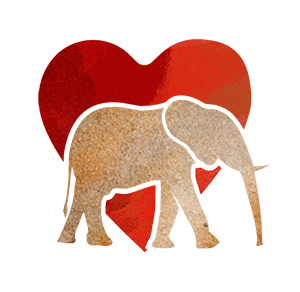On 18th March 2017 KWS received a number of reports from visitors about a tiny orphaned baby elephant wandering alone and abandoned, very thin and with predator bites on his back legs. Our Keepers based at our Voi relocation unit were informed, as was the SWT/KWS Tsavo Mobile Veterinary Unit and the SWT/KWS De-Snaring Team operating within that area. The Rescue Team located the calf after a short search and it became clear that he was in desperate need of rescuing, and in fact with the infamous Tsavo lions plentiful in that area, it was a miracle that he was still alive. Small predators (we suspect jackals), had attacked his rear end and hind legs and hence due to his wounds coupled by poor condition, it was evident that we needed to respond fast.
The reason behind him being abandoned remains a mystery, but there had been a couple of poaching causalities in the area around this time and it is possible that one of these victims was his mother. What often happens in such situations is that the calf remains with the herd, but as it loses strength due to a lack of milk, the herd is forced to abandon it when it can no longer keep up due to its weakened state. This is more than likely what transpired in this baby’s case, because he was incredibly thin and dehydrated when eventually found. It is hard to imagine how frightened and stressed he must have been, all alone in such a hostile environment!
The Rescue Team left the Landcruiser to pursue him in order to restrain him, which proved a simple task due to his lack of reserves, and because he still so young, estimated to be approximately only 3 to 4 months old. Once he was restrained, the Rescue Team lay the baby down, on the Capture Mattress and Canvas Stretcher before driving him to the Voi stockades, where he was kept overnight in a stable with a Keeper by his side. He fed on milk and rehydration salts and despite being restless throughout the night, he did manage to sleep on the soft hay for short periods of time.
![]()
![]()
The following day a team of Keepers from our Nairobi Nursery flew the one and half hour journey to our Voi headquarters of Tsavo East National Park, arriving in the morning in order to collect the baby so that he could be afforded the intensive care he required. He was driven to the Voi airstrip by the Voi Keepers where the two teams swapped their precious cargo, where he was given the opportunity to stretch his legs walking around the airstrip, all the while trustingly following the Keepers and later guzzling down another milk feed before the flight. Once he was safely loaded onto the plane, the Team placed him on IV fluids throughout the flight to help with his compromised condition.
We named this little bull Sattao, after the area in Tsavo East where he was located, which is a favorite place for large herds of elephants to come for water. It was clear we would have quite a challenge to save this little calf as he lost even more condition in the days that followed, but one thing evident from the outset was that he was a fighter and although quiet in nature, he had a steely resolve to live, despite the discomfort from his seeping wounds and his skeletal state.
It was a long while before we saw positive changes in his body condition, but the presence of the others, particularly best friend Luggard, helped his recovery. The bite marks on his legs were cleaned and treated daily until they slowly healed and today little Sattao is finally filling out, growing fatter and more active by the day and ready to be placed on the Trust’s Fostering Program.
![]()
![]()
He has benefited from the love and comfort of our older females, Mbegu and Godoma, who are lavish in their attention of the young babies – carefully ushering them through each day, always carefully guiding them and reassuring them. It is a marvel to watch this beautiful, gentle nurturing nature of elephants, even in those so young, each having experienced trauma themselves - how they are still so selfless in their gentle love and care. Some of our successes in the more challenging cases can be attributed directly to the help and care afforded newcomers by our other resident elephant orphans, healing the traumatic scars of loss that haunt these little orphans by giving them that all important ingredient – the will to live – and in Sattao’s case, that is exactly what happened.
![]()
![]()
He is now very much a part of the herd, joining the main group of orphans in all they do, basking in attention from his new extended family - having found happiness once more. We feel sure he will grow into a huge, handsome bull in the fullness of time, since the “Big Tusker Gene” is very prevalent in that area of the Park.


































